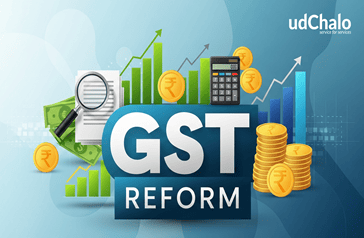ITR Filing Date Extended for AY 2024–25: New Deadline, Penalties & Filing Tips
Key Highlights
- The ITR filing deadline for AY 2024–25 has been officially extended for specific taxpayer categories to September 15th, 2025.
- New due dates vary for individual taxpayers, businesses, and audit cases.
- Missing the revised deadline can result in a penalty of up to ₹5,000 under Section 234F.
- Taxpayers must file ITR even if they have zero tax liability, to claim refunds or carry forward losses.
- Platforms like udChalo simplify tax filing for defence personnel and citizens alike.
Filing your Income Tax Return (ITR) on time is not just a legal requirement—it also helps you claim eligible refunds, carry forward losses, and maintain a clean financial profile. For Assessment Year (AY) 2024–25, the Government of India has announced an extension of the ITR filing date for specific categories of taxpayers, providing some much-needed relief.
In this article, we will examine the new ITR filing deadlines, penalties for late filing, and how to ensure a smooth and stress-free tax filing process before the extended cut-off date.
New ITR Filing Deadline for AY 2024–25
Here are the revised ITR due dates for different types of taxpayers:
| Taxpayer Category | Original Due Date | Extended Due Date |
|---|---|---|
| Individuals (Non-Audit Cases) | 31 July 2024 | 15th September 2025 |
| Businesses Requiring Audit | 31 October 2024 | To be notified |
| Companies or Firms (Non-Audit Cases) | 31 July 2024 | 15th September 2025 |
⚠️ Note: The revised due dates are based on the recent announcement. Final confirmation will be available once the Central Board of Direct Taxes (CBDT) issues the official circular.
Reason for ITR Date Extension
The extension in ITR due dates usually happens due to one or more of the following reasons:
- Delays in Form 16 issuance by employers
- System glitches or high traffic on the Income Tax e-filing portal
- Last-minute changes in utility forms
- Technical or procedural difficulties in filing returns for audit and non-audit taxpayers
The Income Tax Department often announces extensions through official notifications or circulars.
Penalty for Late ITR Filing
If you miss the extended ITR deadline, you may face the following consequences:
- Section 234F Penalty:
- ₹5,000 if filed after the due date but before 31 December 2024
- ₹1,000 if your income is below ₹5 lakh
- Interest under Sections 234A/B/C for delayed payment of advance tax
- Loss of benefits:
- Cannot carry forward losses under "Capital Gains" or "Business Income"
- Delay in receiving tax refunds
Filing late also increases your chances of scrutiny by the Income Tax Department.
How to File ITR Before the New Deadline
Here’s how you can file your Income Tax Return quickly and accurately:
✅ Step-by-step ITR Filing Guide:
- Log in to https://www.incometax.gov.in
- Go to “File Income Tax Return”
- Select AY 2024–25 and ITR form based on income type (ITR-1, ITR-2, etc.)
- Upload details manually or use pre-filled data
- Cross-check the AIS (Annual Information Statement) for transactions
- Submit and e-verify using Aadhaar OTP/net banking
Make sure to keep these documents ready:
- PAN & Aadhaar
- Form 16 / Salary Slips
- Interest certificates (FD, Savings)
- Capital gains statements
- Rent receipts (for HRA claims)
Common Mistakes to Avoid During Last-Minute ITR Filing
- Entering incorrect PAN or IFSC codes
- Not verifying pre-filled income and TDS data
- Skipping tax-exempt income like interest under Section 10(15)
- Failing to e-verify the return within 30 days
- Missing reporting of foreign income or assets
Such errors can either delay your refund or lead to legal notices later.
Expert Tips for Smooth ITR Filing
- File well before the deadline, even if an extension is announced.
- Use trusted platforms like udChalo that cater specifically to salaried individuals and defence personnel.
- Download and reconcile your AIS and Form 26AS before submission.
- Review bank account details to ensure a hassle-free refund credit.
- If you are unsure, consult a tax advisor or a certified accountant to avoid mistakes.
How the ITR Extension Helps Defence Personnel and Veterans
The extension of the Income Tax Return (ITR) filing deadline to September 15, 2025, is a welcome move, especially for the defence community. Given their service obligations and unique circumstances, this update brings several benefits:
More time to comply: Defence personnel, particularly those posted in remote areas or on field duty, often have limited access to tax filing support. The extended deadline gives them the flexibility to file without the pressure of time.
Simplifies post-retirement filing: Retired defence personnel may face delays in receiving pension statements or Form 16s. The extension provides them with sufficient time to reconcile documents and file without incurring penalties.
Helps with form corrections: It is common for serving or retired defence members to encounter TDS mismatches or missing income details. The added time allows for rectification and accurate filing.
Enables informed decisions: With additional time, personnel can evaluate deductions, rebates, and exemptions more effectively, ensuring optimal tax planning.
Boosts digital adoption: More time to file also encourages defence families to explore secure and defence-friendly platforms like udChalo’s Tax Services, which simplify the ITR process with expert assistance.
Don’t Wait—File Early and File Smart
While the ITR filing deadline for AY 2024-25 is now 15 September 2025, it is advisable not to wait until the last moment. Filing early ensures fewer errors, timely refunds, and a smoother experience. Whether you are actively serving or a retired member of the armed forces, make use of the time to file your taxes with clarity and care.
For secure and simple ITR filing, visit udChalo’s Tax Services. Designed for the defence community, it connects you with trusted experts who understand your unique needs.
FAQs
1. What is the extended ITR filing date for AY 2024–25?
The new ITR filing deadline will be notified by the Central Board of Direct Taxes (CBDT). It is expected to be extended by a month or more for specific categories.
2. Who can benefit from the ITR deadline extension?
Typically, salaried employees, businesses under audit, and companies may benefit. Please refer to the official circular for specific details on applicability.
3. What if I miss the extended deadline, too?
You’ll face a penalty of ₹1,000 to ₹5,000 and may lose benefits like carry-forward of losses or timely refunds.
4. Is e-verification necessary after filing ITR?
Yes, e-verification within 30 days of filing is mandatory to complete the ITR process.
5. Can I revise my ITR after the extended deadline?
Yes, but only until 31 December 2024 or as per the revised deadline for belated returns.
6. How do I know which ITR form to use?
It depends on your income type. Most salaried individuals use ITR-1, but you may need to use ITR-2 or ITR-3 if you have capital gains or business income. Read more about types of ITR forms here.
7. Is it compulsory to file ITR if my income is below the taxable limit?
No, but you should file if you want to claim TDS refunds or carry forward losses.
8. Does udChalo offer online ITR filing support?
Yes, udChalo’s Tax Services simplifies tax filing for Indian defence personnel and civilians.
9. Can I claim HRA without rent receipts?
No, rent receipts or other documentary proof are essential to claim HRA exemptions.
10. Will I get a refund if I file after the extended date?
Yes, you may still get a refund, but with possible delays and scrutiny.
Related Articles

The Next-Gen GST Reform 2025 brings significant tax relief across essentials, healthcare, farming, education, automobiles, and electronics. Here’s a complete breakdown of what’s cheaper and how it supports soldiers, veterans, and families.

This Navratri and Diwali, India celebrates with savings thanks to the Next-Gen GST Reform 2025. Electronics, cars, and real estate are now more affordable, benefiting both civilian and defence families.

Timely filing of your return isn’t just about avoiding penalties. It can also help you earn more through interest on your tax refund. Here’s why the 15 September 2025 deadline is critical for boosting your refund.
Related Post

The Next-Gen GST Reform 2025 brings significant tax relief across essentials, healthcare, farming, education, automobiles, and electronics. Here’s a complete breakdown of what’s cheaper and how it supports soldiers, veterans, and families.

This Navratri and Diwali, India celebrates with savings thanks to the Next-Gen GST Reform 2025. Electronics, cars, and real estate are now more affordable, benefiting both civilian and defence families.

Timely filing of your return isn’t just about avoiding penalties. It can also help you earn more through interest on your tax refund. Here’s why the 15 September 2025 deadline is critical for boosting your refund.








